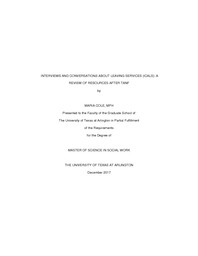
ATTENTION: The works hosted here are being migrated to a new repository that will consolidate resources, improve discoverability, and better show UTA's research impact on the global community. We will update authors as the migration progresses. Please see MavMatrix for more information.
Show simple item record
| dc.contributor.advisor | Hegar, Rebecca L. | |
| dc.creator | Cole, Maria C. | |
| dc.date.accessioned | 2018-02-15T20:56:47Z | |
| dc.date.available | 2018-02-15T20:56:47Z | |
| dc.date.created | 2017-12 | |
| dc.date.issued | 2017-12-11 | |
| dc.date.submitted | December 2017 | |
| dc.identifier.uri | http://hdl.handle.net/10106/27196 | |
| dc.description.abstract | The Temporary Assistance for Needy Families (TANF) policy is designed to protect the nation’s most vulnerable families from severe hardship. The policy encourages moving people from “welfare to work” and improving child welfare. TANF, though, has remained largely unchanged since its adoption in 1996 despite persistent poverty nationwide and worsening poverty in the Dallas-Fort Worth metropolitan area. Consequently, TANF has not effectively responded to poverty nor has it improved child welfare.
The researcher conducted a comprehensive literature review which identified employment barriers found to affect families leaving TANF services. Several studies illuminated that mental or behavioral health, substance abuse, race or ethnicity, having a child with a disability, health and access to health care, domestic abuse, educational opportunities, social support, regional or geographic location, food insecurity, and structural obstacles presented barriers to gaining and maintaining employment. A second literature review identified transitional services and programs that were available to families that left TANF; the researcher found three articles that discussed program outcomes from states that had implemented large-scale transitional services programs.
The researcher set out to conduct a strengths-and-needs assessment through focus groups and interviews to explore the services available and the gaps in services for families leaving TANF. The researcher collected qualitative interview data from families who had left the TANF program within the last 3 years (n = 5) and organizational members who played a role in providing services to this population (n = 8). Using Grounded Theory Methods (GTM), the researcher analyzes the qualitative data and proposes a framework for a transitional services program.
The respondents cited barriers such as job readiness, transportation, systemic or structural barriers, unreasonable requirements or statutes, and lack of financial resources as the most significant obstacles to delivering services. They also cited illness, childcare, transportation, being a single parent, and lack of stable housing as the strongest barriers to maintaining employment.
The researcher discusses the need to have transitional support services to help to stabilize families exiting TANF to achieve self-sufficiency. The researcher also illustrates and advocates the need to have comprehensive policies such as universal healthcare, childcare, and a reliable transportation system to support families leaving TANF. | |
| dc.format.mimetype | application/pdf | |
| dc.language.iso | en_US | |
| dc.subject | Social welfare | |
| dc.subject | TANF | |
| dc.subject | Grounded Theory Methods (GTM) | |
| dc.title | Interviews and Conversations about Leaving Services (iCALS): A Review of Resources after TANF | |
| dc.type | Thesis | |
| dc.degree.department | Social Work | |
| dc.degree.name | Master of Science in Social Work | |
| dc.date.updated | 2018-02-15T20:57:50Z | |
| thesis.degree.department | Social Work | |
| thesis.degree.grantor | The University of Texas at Arlington | |
| thesis.degree.level | Masters | |
| thesis.degree.name | Master of Science in Social Work | |
| dc.type.material | text | |
| dc.creator.orcid | 0000-0003-3285-0774 | |
Files in this item
- Name:
- COLE-THESIS-2017.pdf
- Size:
- 2.183Mb
- Format:
- PDF
This item appears in the following Collection(s)
Show simple item record


